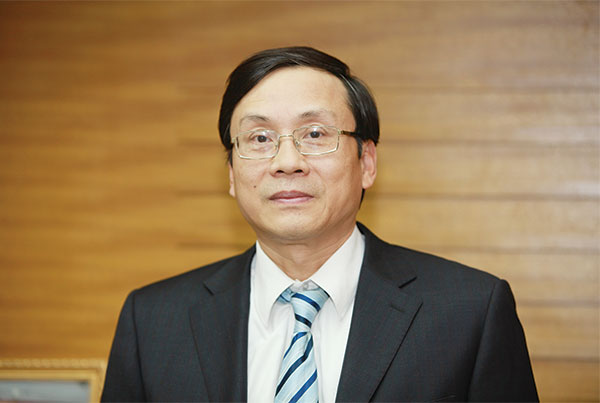20 years as bedrock of bourse
 |
When the market overheats or encounters unexpected problems, has the State Securities Commission (SSC) considered suspending trading to protect investors?
The option of suspending trade has been considered in the past, especially when the market grew too hot during the 2007-2008 period and market sentiment was tense. I was under immense pressure at that time, as a single second could make a drastic difference to investors, and the listed companies’ market values. This is a common pressure for everyone working in the securities market.
The most significant lesson we learned after these troubled times is that regulators must remain cool-headed in order to keep overheated situations calm. I’d like to give you a recent example: SSC proposed solutions to Deputy Prime Minister Vuong Dinh Hue for how to control the Vietnamese market during Brexit [the UK’s referendum to leave the European Union]. We received praise from the deputy prime minister as the proposal was detailed, timely, and practical, showing SSC’s experience in protecting the market from external turmoil.
Around the world, there are two kinds of trading suspension: temporary or long-term. Indonesia and Thailand have closed their markets for some years before re-opening, and we’re proud to say that throughout its 20 years of development, the Vietnamese stock market has never been suspended. Trading continues with ever-increasing levels of security to this day.
Do you have any regrets or unfinished tasks in your two decades of working at SSC?
First, I have to say that to develop a sustainable market, we need a united effort from multiple industries. Co-operation on monetary policy is especially important. The stock market has improved greatly thanks to improved co-operation between Vietnam’s monetary and fiscal policies.
Over the years, SSC has tirelessly formulated solutions to improve transparency, information disclosure, and fairness in the Vietnamese market. However, our control remains limited, especially as SSC does not have any investigatory rights like other lawmakers.
For example, we cannot access investors’ bank accounts or emails, and cannot arrest any suspects. This has hindered our response to many scams, especially price manipulation and insider trading. We also cannot sign multilateral agreements with other countries due to the lack of investigatory powers.
Moreover, Vietnam’s punishments for white-collar crimes are not harsh enough to deter financial criminals. In other markets, fines can reach millions of US dollars for each case.
Lastly, other countries have specific rules to protect lawmakers in the stock market. Vietnam does not have this yet, so many SSC officers have been blackmailed or harassed by criminals.
What are some of the most difficult decisions that you’ve made during your tenure as SSC chairman?
The most challenging decisions for me have been criminal cases, which I need to transfer to the relevant authorities to prosecute in court. It’s hard but necessary to protect the market, improve transparency, and earn investors’ trust.
In addition, we have to reduce the trading margin when mass selling occurs and market value falls. SSC receives a lot of criticism about this, so that also counts as a very difficult decision for us.
That’s a lot of pressure for you and SSC. What do you see as pleasurable about your work?
Nothing can describe my happiness when seeing the market grow day by day and receiving positive feedback from investors. I’m also happy when I see that investors have reaped their well-deserved rewards from an increasingly transparent market.
As the Lunar New Year draws closer, what message do you have for investors and the market?
Often investors understand that some businesses are not transparent, and they will still buy stocks regardless, for speculative purposes. These investors tend to think they will be okay and all risks will be passed down to later buyers.
However, reality has shown that this is not always the case, and many investors have lost money because of this attitude toward trading. Even if these investors win, this is not a fair victory.
I mention this to remind investors that, to lower risks, they should pour capital into fundamentally good companies with great corporate governance. Investors should not be blinded by quick profits and speculation.
When there is turmoil in the market, investors ought to remain calm to avoid losing money.
What the stars mean:
★ Poor ★ ★ Promising ★★★ Good ★★★★ Very good ★★★★★ Exceptional
Latest News
More News
- Cashless payments hit 28 times GDP in 2025 (February 04, 2026 | 18:09)
- SSIAM and DBJ launch Japan Vietnam Capital Fund (February 04, 2026 | 15:57)
- Banks target stronger profits, credit growth in 2026 (February 04, 2026 | 15:43)
- Vietnam on path to investment-grade rating (February 03, 2026 | 13:07)
- Consumer finance sector posts sharp profit growth (February 03, 2026 | 13:05)
- Insurance market building the next chapter of protection (February 02, 2026 | 11:16)
- NAB Innovation Centre underscores Vietnam’s appeal for tech investment (January 30, 2026 | 11:16)
- Vietnam strengthens public debt management with World Bank and IMF (January 30, 2026 | 11:00)
- Corporate bond market poised for stronger growth cycle (January 28, 2026 | 17:13)
- Vietnam's IPO market on recovery trajectory (January 28, 2026 | 17:04)
















 Mobile Version
Mobile Version